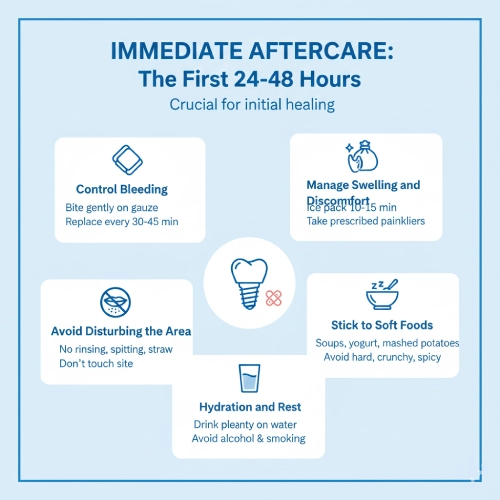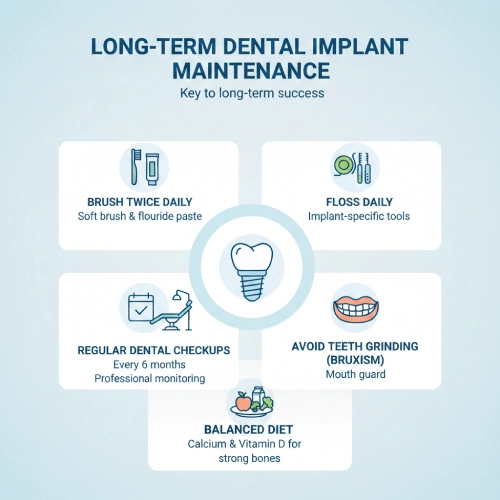Dental implants are one of the most advanced and effective solutions for replacing missing teeth — providing both aesthetic appeal and functional strength similar to natural teeth. However, the long-term success of an implant depends largely on how well you care for it after the procedure. Proper dental implant care is crucial to ensure your new smile remains healthy, strong, and beautiful for years to come.
In this guide, we’ll take you through essential post-dental implant tips, expert implant aftercare instructions, and the best practices for maintaining dental implants — all designed to help you recover quickly and protect your investment in your oral health.
Understanding the Importance of Dental Implant Care
Dental implants are titanium posts surgically placed into your jawbone, acting as artificial roots to support crowns, bridges, or dentures. Once the implant integrates with your bone through a process called osseointegration, it becomes a permanent foundation for your replacement tooth.
However, the healing process doesn’t end once the implant is placed. The weeks and months following surgery are critical for recovery. Neglecting proper care can lead to infection, delayed healing, or even implant failure.
That’s why following your dentist’s implant aftercare instructions is not just recommended — it’s essential.
Immediate Aftercare: The First 24–48 Hours
 The first two days after implant surgery are crucial. This period determines how well your implant begins to heal. Here’s what to do:
The first two days after implant surgery are crucial. This period determines how well your implant begins to heal. Here’s what to do:
- Control Bleeding
It’s normal to experience light bleeding for the first few hours. Bite gently on gauze pads and replace them every 30–45 minutes until bleeding stops. - Manage Swelling and Discomfort
Apply an ice pack on the cheek near the surgical site for 10–15 minutes at a time. This helps reduce swelling and pain. Your dentist may also prescribe painkillers — take them as directed. - Avoid Disturbing the Area
Refrain from touching the surgical site with your fingers or tongue. Avoid rinsing, spitting, or using a straw for the first 24 hours — this can dislodge the blood clot and slow healing. - Stick to Soft Foods
Eat soft foods like soups, yogurt, and mashed potatoes. Avoid anything hard, crunchy, or spicy during the initial recovery period. - Hydration and Rest
Drink plenty of water and get enough rest to help your body heal naturally. Avoid alcohol and smoking, as both can interfere with healing and increase infection risk.
The First Week: Establishing Gentle Hygiene
Good oral hygiene during recovery prevents infection and promotes faster healing. However, you need to clean carefully.
- Rinse with Salt Water
After 24 hours, gently rinse your mouth with warm salt water (½ teaspoon salt in a glass of water) several times a day, especially after meals. - Brushing Carefully
Brush your teeth gently with a soft-bristle toothbrush. Avoid direct brushing on the surgical area for the first few days. - Avoid Mouthwash Containing Alcohol
Alcohol-based mouthwashes can irritate the surgical site. Use a non-alcoholic, antimicrobial rinse if your dentist recommends one. - Watch for Warning Signs
If you notice prolonged bleeding, swelling, or severe pain, contact your dentist immediately.
Dental Implant Recovery Timeline
While recovery varies from person to person, most patients experience the following stages:
- 1–2 Days Post-Surgery: Swelling, minor bleeding, and tenderness.
- 1 Week: Most discomfort subsides. Stitches (if any) may be removed.
- 2–6 Weeks: The implant begins fusing with the jawbone.
- 3–6 Months: Complete osseointegration occurs, and the final crown is placed.
During this time, following your dental implant care instructions consistently ensures the implant bonds securely with your bone, minimizing complications.
Diet Tips for Faster Healing
Your diet plays a key role in recovery. Choose foods that are easy to chew and rich in nutrients to boost healing:
- Soft Proteins: Scrambled eggs, tofu, fish, lentils.
- Fruits & Vegetables: Smoothies, mashed bananas, avocados, steamed vegetables.
- Whole Grains: Oatmeal, rice, or pasta.
- Avoid: Hard nuts, crunchy snacks, sticky candies, and acidic foods.
Also, avoid extremely hot beverages — they can disturb the healing site. Opt for lukewarm soups or cool smoothies instead.
Avoid Smoking and Alcohol
Both smoking and alcohol slow down healing by reducing blood flow and oxygen supply to the tissues. They also increase the risk of infection and implant failure. If you smoke, consider this your best opportunity to quit — even temporary cessation during recovery makes a difference.
Long-Term Dental Implant Maintenance
 Once your implant has healed and your crown or bridge is placed, maintaining your oral hygiene is key to long-term success. Dental implants require the same (if not more) care as natural teeth.
Once your implant has healed and your crown or bridge is placed, maintaining your oral hygiene is key to long-term success. Dental implants require the same (if not more) care as natural teeth.
Here’s how to maintain them:
- Brush Twice Daily
Use a soft toothbrush and fluoride toothpaste to remove plaque around the implant. - Floss Daily
Use floss threaders or interdental brushes designed for implants to clean between teeth and around the implant base. - Schedule Regular Dental Checkups
Visit your dentist every six months for cleaning and examination. Professional monitoring helps detect any early signs of gum inflammation or bone loss. - Avoid Teeth Grinding (Bruxism)
If you grind your teeth at night, ask your dentist about a mouth guard to protect your implant and other teeth. - Maintain a Balanced Diet
Foods rich in calcium and vitamin D strengthen your bones and gums, helping your implant remain stable.
Common Mistakes to Avoid During Recovery
Even the best dental implants can fail if aftercare is neglected. Avoid these common errors:
- Ignoring post-surgery instructions
- Skipping medications or antibiotics
- Smoking too soon after surgery
- Poor oral hygiene during healing
- Eating hard foods too early
- Delaying follow-up appointments
Your dentist will provide personalized implant aftercare instructions based on your case — follow them closely to ensure optimal healing.
When to Contact Your Dentist
You should reach out to your dental specialist immediately if you notice any of the following symptoms:
- Persistent pain beyond a few days
- Excessive bleeding or swelling
- Pus or unusual discharge near the implant
- Implant feels loose or moves when touched
- Fever or signs of infection
Prompt communication helps address potential issues before they become serious.
The Key to a Long-Lasting Smile
With the right dental implant care, you can expect your implants to last for decades — even a lifetime. They not only restore your smile but also preserve bone health, improve chewing, and boost confidence. Consistency in hygiene, regular checkups, and mindful habits will ensure your implant remains healthy and strong.
If you’re considering dental implants in Dubai or need personalized aftercare guidance, DentisTree Dental Clinic offers comprehensive implant treatments and expert care from top specialists. Our team ensures every patient receives individualized attention — from surgery to recovery and long-term maintenance.
Ready to Restore Your Smile?
If you have questions about your implant recovery or need to book a follow-up appointment, we’re just a message away!
📍 Al Barsha Branch: +971 58 581 5201
📍 Jumeirah Branch: +971 56 608 4766
Contact DentisTree Dental Clinic on WhatsApp for expert advice, personalized care tips, or to schedule your consultation today.
Let’s make your smile stronger, healthier, and more confident — for life.





